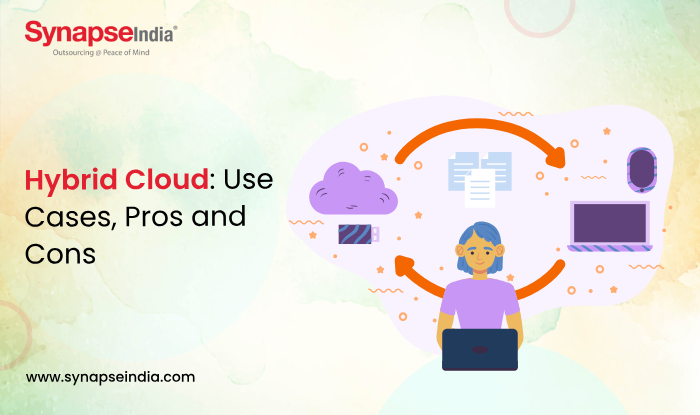 26 Apr 2024
26 Apr 2024“In a hybrid cloud setup, data and applications can seamlessly move between on-premises servers and cloud environments, offering flexibility, scalability, and cost-effectiveness.”

With the rapid transformation in the IT infrastructure, data management, and artificial intelligence (AI), hybrid cloud plays an important role in next-generation IT infrastructure. Businesses that are on the enterprise level rely on hybrid solutions to run critical workloads from anywhere by combining and unifying on-premises, private cloud, and public cloud environments. Just like any other IT solution, adopting successful hybrid solution strategies to start with examines how cloud computing architecture drives overall business objectives. An initial step towards a successful business brings IT leaders to review the advantages and disadvantages of hybrid adoption. In this blog we will review what is hybrid cloud, suggest use cases, and pros and cons.
Hybrid cloud computing is an environment that combines hardware and software running in a company’s on-premise data center with computing capacity in a public cloud by a third-party provider. Most organizations have established governance security and privacy policies that apply across the IT systems they use, including on-premise and public cloud-based resources. The tools used to instantiate these high-level policies will vary; public cloud providers share the management burden of networks and compute and storage resources with their consumers. On the other hand, on-premise systems are managed by the organization's internal staff.
Hybrid cloud solutions offer a flexible and versatile approach to cloud computing by combining public and private cloud environments. Here are some common use cases of hybrid cloud:
With a hybrid cloud, businesses can store important information and programs on-site in private clouds as well as on public cloud platforms. In addition to offering a dependable backup and disaster recovery plan, this configuration guarantees redundancy. Businesses can promptly resume operations using the backup data kept in the hybrid cloud in the case of a system breakdown or data loss.
Organizations may flexibly scale their IT resources in response to changing demands thanks to the hybrid cloud. Businesses can keep sensitive or mission-critical workloads on-premises or in a private cloud environment while using the scalability of public cloud services to manage peak workloads and seasonal demands.
Data compliance regulations in industries like healthcare, finance, and government sometimes demand sensitive data to be processed and stored in certain geographical areas or on-site infrastructure. By separating data processing and storage according to legal requirements, hybrid cloud solutions help businesses stay in compliance with regulatory norms.
These are just a few instances of how hybrid cloud solutions may be used to meet different business needs and overcome different obstacles, giving businesses more adaptability, scalability, and agility when it comes to their cloud computing plans.
Hybrid cloud solutions offer several advantages for organizations seeking a flexible and scalable approach to cloud computing . Here are some of the key pros of hybrid cloud:
Hybrid cloud architectures allow organizations to both public and private cloud environments, providing greater flexibility to meet diverse business requirements.
Keeping the elasticity of public cloud services, organizations can handle sudden spikes in demand while maintaining control over critical or sensitive workloads in private cloud environments.
Companies can use the pay-as-you-go model of public cloud services for variable workloads while using on-premises infrastructure or private cloud environments for predictable or steady-state workloads, thereby minimizing overall cloud costs.
All things considered, hybrid cloud solutions give businesses the adaptability, scalability, affordability, security, and resilience they need to handle a wide range of business needs and obstacles in the ever-changing digital environment of today. Organizations may achieve increased agility, creativity, and competitive advantage in their cloud computing initiatives by fusing the finest features of both public and private cloud worlds.
While hybrid cloud solutions offer numerous benefits, they also come with certain challenges and limitations. Here are some of the cons of hybrid cloud:
Managing hybrid cloud environments can be complex due to the integration of multiple cloud platforms, on-premises infrastructure, and networking configurations.
Integrating and interoperating between public cloud services and private infrastructure can be challenging, especially when dealing with different technologies, APIs, and security protocols.
Hybrid cloud environments introduce additional security risks, particularly at the points of integration between public and private clouds .
Overall, while hybrid cloud solutions offer numerous benefits, organizations need to carefully evaluate the trade-offs and challenges associated with managing hybrid cloud environments.
To satisfy the many demands of contemporary enterprises, a hybrid cloud is a flexible and adaptable solution that combines public cloud services with on-premises infrastructure. Hybrid cloud computing has several advantages, such as greater scalability, flexibility, and cost savings, but it also has drawbacks and restrictions. Through the proactive resolution of these issues and the application of best practices, enterprises can optimize the advantages of hybrid cloud computing while proficiently managing associated risks.
Additionally, a hybrid cloud is a strategic approach to cloud adoption that, by using the advantages of both public and private cloud environments, enables organizations to accomplish their business objectives. Hybrid clouds will continue to be an essential part of today's IT environment, fostering innovation, adaptability, and competitiveness for businesses all over the world as technology advances.


